- Home
- Juliet Marillier
The Well of Shades Page 35
The Well of Shades Read online
Page 35
“Help!” shrieked Breda, and the mare took fright anew, swerving abruptly to head for the wetlands. Bridei knew this place well. There was sucking bog close by; the marsh that would slow the panicked flight might as likely swallow horse and rider together.
He kicked Snowfire’s flanks; Dovran urged his own mount on, keeping pace on his left. These horses had seen battle after battle. They were as one with their riders. Long ago, a man called Donal had taught Bridei certain tricks of horsemanship, and he had passed them on to each of his guards in turn. The mare tossed her head as they came up on either side; the foam of her spittle flew. Breda’s hair had escaped its neat confinement and streamed out in the sea breeze, a golden banner. As the two men closed in, each spoke to his mount then slid sideways in the saddle, leaning in toward mare and rider. Dovran stretched to snatch the mare’s bridle, maintaining momentum forward. Bridei grabbed the easiest part of Breda to lay hands on: her hair. “Ow!” she screamed. He edged Snowfire in closer as Dovran began to slow his horse’s pace, easing the terrified mare gradually back. Bridei leaned across the gap between Snowfire and the mare, the weight of his upper body holding the gasping Breda safe from falling. The desperate flight became a gallop, a canter, a faltering, exhausted stumble. They halted.
What the rescue had lacked in dignity and comfort it had certainly made up in efficiency. Bridei disengaged himself and helped the girl to the ground while Dovran stood murmuring to the mare and checking her over for damage. Their ride had carried them a long way. The rest of the hunting party could be seen only as a distant jumble of small figures moving about. Nobody had followed them, and that seemed rather odd. A sense of foreboding came over Bridei. The girl was shaken but unharmed, save for a few bruises. Dovran declared the mare sound of limb, though severely scratched by the bushes she had brushed on her headlong flight. But something was wrong.
“You take Lady Breda with you,” Bridei told his guard. “I’ll lead the mare.”
Dovran obeyed, cupping his hands to help Breda to the saddle.
“Best for you to ride again straightaway,” Bridei told her. “It will help you regain your confidence.” He kept his tone brisk but watched Breda closely nonetheless. Although breathless, she was remarkably composed after her adventure. As Dovran vaulted to the saddle behind her, she turned her head to look at him admiringly, a becoming blush rising to her cheeks. Dovran set his gaze sternly ahead.
“Very well,” said Bridei, one hand holding the mare’s reins and the other on Snowfire’s neck. “Keep the pace steady; this creature’s had a severe fright.”
As they crossed the uneven field, the little figures grew larger and their activities clearer.
“Flamekeeper help us,” muttered Dovran, “what’s happened? What damage has been wrought?”
But Bridei said not a word as they discerned each cruel detail in turn: men improvising a stretcher, folk clustered around someone sitting on the ground, a man kneeling with his hands over his face. Keother was giving orders and Bridei’s own folk were hurrying to obey. And, as the riders reached the edge of the hunt party, where grooms held several horses and dogs milled about, he saw a cloak laid out on the sward, and under it a still shape. One foot protruded from the covering; a smallish foot clad in a lady’s riding boot. The weeping man was one of Keother’s.
“Oh no, oh no, oh no…” Breda began to gasp.
“It’s all right, my lady, don’t distress yourself,” Dovran said awkwardly. But the princess of the Light Isles slid down from his horse and stumbled forward to crouch by the prone form and draw aside the gray wool of the covering. The afternoon sun fell on the blanched features and staring eyes of her dark-haired handmaid, the one whose father was Keother’s adviser, the man crouched by her waxen-faced and shaking. There was a crimson stain all across the girl’s left temple and in her hair.
Breda said nothing. She pulled the cloak back over her handmaid’s body and stepped away. “She’s dead,” she said in a flat voice. Bridei put her blank expression down to shock. “Cella’s dead.”
Bridei dismounted. It seemed clear that in its plunging descent the rearing mare had wrought terrible damage here before its flight. “Keother,” he said with what control he could summon, “this is an ill end to our day’s sport. I’m more sorry than I can tell you. Your cousin has escaped harm. But this young woman—”
“Struck by the animal’s hoof.” It was Talorgen’s voice; Bridei spotted him now, at a short distance, kneeling beside his son Bedo. The boy was sheet white, his jaw set against pain, his eyes fierce. His father was fastening a rudimentary sling around an arm that was, without a doubt, broken between wrist and elbow. Uric, equally pale, stood beside them with the dead girl’s hawk, hooded and quiet, on his glove.
“She—” Bedo began, then drew a hissing breath as Talorgen eased the sling into place. “She screamed—”
“Hush,” his father said. “Later. Bridei, as you see, my son, too, was injured. Uric was thrown to the ground but is unharmed. We have men making stretchers to bear the poor lass back, and for Bedo here.”
“I can walk,” Bedo snapped. His tone spoke as much of fury as of pain.
“I’m sorry,” Bridei said again. It was woefully inadequate. The gods, after all, had chosen to be cruel today. “Bedo, listen to your father. The sooner you get that to a bonesetter, the better your chance of mending well enough to use sword and bow once more. Keother? We must say a prayer over the young lady’s body; then we will convey her back to White Hill as gently as we may.” He knelt by the girl’s father. “I offer you my respects, friend, and my deepest apology that this has occurred on your visit to Fortriu, and on my territory. No words can express my sorrow. Come, let us join in a prayer, then make our sad way home.”
MUCH LATER, WHEN all had returned to court and Cella’s body had been washed and wrapped for burial, Bridei stood in the small upper courtyard with its round stone table, watching the moon rise and trying to set his thoughts in order. He had spoken to the assembled household; let them know that it was his own wish and Keother’s, as well as that of Cella’s father, that her funeral rite be held promptly here at White Hill, there being insufficient time for her mother to travel from the Light Isles to bid her only daughter farewell. By the time news of the tragic accident reached home, Cella would have been dead two turnings of the moon. Summer flowers would be growing on her grave. If she had stayed at home, she might be playing with her dog now, or watching the moon come up over the sea, or strumming her harp. Through his tears, her father had mentioned her exceptional talent for music.
Bridei had announced that the victory feast would go ahead as planned, since so many had traveled so far to be present. The celebrations would be tinged by sadness. This new tragedy could only remind folk of how many had been lost in last autumn’s war. Victory came hand in hand with sorrow.
He stood alone now, save for the undemanding presence of his dog Ban at his feet and Garth’s solid form on guard a short way off. Soon Bridei would go down to Tuala. He would talk it through with her, just the two of them, seeking comfort in the calm and balance she brought to the most challenging situations. He would find solace in the sweet forms of his sleeping children, for whom life, so far, had been mercifully free of cruel complications.
Today’s death was sad; it was all too easy to put himself in that man’s shoes, the man whose daughter Bone Mother had snatched, in an instant, quite arbitrarily out of this world. If it had been Derelei or Anfreda, Bridei doubted his own capacity to act with such dignity and restraint. He thought he would scream, rail at the gods, prostrate himself on the earth. At such an extreme he knew the king would take second place to the father.
Ban whined and Bridei bent to reassure him. “It’s all right, good boy.”
“Who’s there?” Garth’s stern voice, breaking through his own. “Identify yourself!”
“Talorgen. I’m alone.” The chieftain of Raven’s Well sounded desperately weary.
“All right, Garth,” Br
idei said. “Come up, Talorgen, I’m here by the table. How is your son doing?”
“The bonesetter is cautiously pleased,” Talorgen said, coming across the little courtyard to stand by the king’s side. The moonlight rendered his handsome features into a grim mask; there was no sign of the ready smile folk knew so well. “Only one bone snapped. It’s possible Bedo will regain full strength in the arm, as long as he heeds the physician’s advice, which includes the unwelcome instruction to rest for two full turnings of the moon and keep the limb strapped. Bridei…”
“Out with it,” Bridei said. They were old friends; Bridei had spent a good portion of his years, as he grew from child to man, in this tall chieftain’s household. At Raven’s Well he had learned skills he could not have developed in the scholarly realm of the druid’s house at Pitnochie. “Something’s wrong, isn’t it? I feel it.”
“We’re all unsettled.” Talorgen leaned back against the stone wall, folding his arms. “That was an ill chance.”
Bridei waited, offering no response.
“My son,” the chieftain said, lowering his voice, “strapped up and resting, with a herbal posset by his bed and a court physician scowling at him if he so much as twitches a finger… Bedo’s making some very odd accusations, Bridei. I feel distinctly unsettled by this whole episode. Of course, we’re all on edge over this matter of Carnach. We sorely need word from Faolan, if not from our missing chieftain himself. If rebellion is brewing, we must be ready for it.”
Bridei traced a pattern on the table’s stone surface with his finger. The moonlight sent the shadow of his hand across the wall like a giant, clutching claw. “What exactly has Bedo said?” he asked quietly.
“He seems to believe what happened was not entirely an accident,” Talorgen murmured. “That there was something odd about the way Breda’s horse reared so suddenly, for no apparent reason. The boy’s wound tight as a spring. This is especially distressing for him, since he and the girl, Cella, had become friends. I know what it’s like to be a lad just becoming a man. Bedo’s a mass of confused feelings. The sudden death of a girl his own age must make him question the gods, if not the workings of our day to day lives. All the same, he’s a steady boy, reliable and calm. Mature for his years. Not that he’s gone to pieces; not exactly. The pieces are inside. He’s holding them together by sheer effort of will. Uric seems to share the same suspicions: that perhaps somebody caused the whole thing; that someone wanted the girl harmed. That seems less than likely to me; this was a handmaid, after all, even if her father was quite well connected. All the same…”
“Say it, Talorgen. Nobody can hear us save Garth, who is the soul of discretion. By the way, where is your own guard? You should not come out alone.”
“I left him with the boys, watching their door. Maybe I’m growing old, Bridei. Tonight I find myself beset by irrational fears.” He drew his cloak around him.
“Let me ask you a question.”
“Ask it.”
“What did make Breda’s mare bolt? Did a bird fly low? One of the hawks startle? Someone make a loud noise? That horse is one of ours, chosen for our royal guest because of its equable temperament. Queen Rhian used to ride it for hunting.”
Talorgen remained silent.
“Your sons were helping Cella settle her bird. The merlin may have made a sudden movement. All the same, the young men are right in thinking such a small thing should not set a well-behaved horse in a panic.”
“Perhaps Breda is a less experienced rider than most highborn girls her age.” Talorgen sounded unconvinced by his own words.
“She hung on quite tenaciously when the creature bolted, even if she could not arrest its flight,” Bridei said.
“True. Your rescue was an act of great skill and courage, Bridei; in the horror of the aftermath, nobody remembered to mention that.”
“It was nothing. We merely acted as the circumstances required. Thank the gods for Donal’s tricks in horsemanship. Without those, Breda would have a broken leg at best, or at worst be drowned in the bog along with the wretched horse. Talorgen, in a way I understand your sons’ concern, but I cannot think there is much real foundation for it. An attack would hardly be aimed at the unfortunate girl who was killed. If it was intended to harm Keother’s young cousin, I cannot think of a good reason why.”
“I can think of several,” Talorgen said drily. “To create instability for you; to drive a wedge between yourself and Keother, with whom cordial relations are essential. To remind Keother how easily death can strike in the middle of a pleasurable activity on a sunny day.”
“You mean, to keep the king of the Light Isles compliant?”
“It is one theory.”
“Talorgen,” Bridei said, “were that the reason for this act, then surely the most likely perpetrator would be me. Or my agents. I am Keother’s only overlord. With Breda as my guest, placed perfectly as a potential hostage against her cousin’s good behavior, I hardly need to kill a young lady to make a point.”
“Nobody in his right mind could suspect you, Bridei.”
“You know me. Others do not.”
“We must also consider that Keother may have developed new alliances.” Talorgen glanced about and lowered his voice still further. “This matter of Carnach, for instance. If it’s true he’s setting up against you, and he has already canvassed Keother for support, the two of them could mount a challenge from north and south. Or Keother may be in league with the Caitt chieftains. We know little of the allegiances of those in the far north, just a hop and a step across from Keother’s home islands.”
“My friend,” Bridei said, “I know you’re concerned for your son; such an injury is a serious matter for a young man whose future must include service as a warrior. I believe it highly likely that what you said earlier is the key to this; Bedo’s feelings for the girl who died and his confusion and distress that violent death has come so close to him. These boys suffered a grievous loss when they were younger; the death of an admired elder brother must leave a deep scar. I hope it does not offend you that I mention that; it may play a part in the way Uric and Bedo deal with this. I am reluctant to consider theories of conspiracy. I am still more reluctant to discuss them with Keother; that could be extremely awkward. I suppose Breda could be questioned. When she’s recovered from her shock, perhaps she may recall what alarmed the mare. We can’t do that now; I’ve been told she’s tucked up in bed. I will have a word to Keother in the morning; it may be more appropriate for him to question her. He conducted himself well today. The circumstances have been difficult for him; the girl’s father is distraught. We must allow them all a little time.”
“I expect you’re right,” Talorgen said quietly. “Perhaps I’m simply suffering a bout of fatherly anxiety. It distresses me to see my boys hurt. They’re good lads, the two of them.”
“Indeed. Advise your son from me to obey his physician and rest that arm. I’m inclined to believe this was no more than it seemed: an unusual accident with tragic consequences. But you can also tell Bedo I will consider folk’s accounts of what occurred to see if there is any foundation to his theory. Gods aid us, we have a funeral, a wedding, and a celebratory feast to endure in the space of a couple of days. I pray that we are sent no more catastrophes until those observances are over. As for Carnach, I will seek the wisdom of the gods once again. Perhaps I can persuade Fola to cast an augury.” There was another avenue of guidance, a far more potent one, but he would not mention that even to Talorgen, close friend and trusted adviser. Tuala could scry for answers. She could seek news of Carnach in the water of a seer’s vessel. If Bridei asked her, it must be in private and the vision must be sought behind closed doors. “If that fails to provide answers,” he said, “I suppose we must wait for Faolan.”
12
HIS HANDS CURLED around a beaker of ale, Faolan sat in a shadowy corner of the drinking hall at Thorn Bridge, watching and listening. His mission had carried him far to the southeast, near Carnach’s home ter
ritory of Thorn Bend and even closer to the Circinn border.
He knew the man who ran this hostelry; long ago, he had seen the advantage of befriending the fellow. Each time he passed this way, he made sure he carried a small payment in silver.
There was no settlement here, just the bridge and the inn, with a farm or two close by. It was pleasant, rolling country dotted with trees; the sheep that grazed in these fields looked fat and healthy. Through the strath ran the river Thorn, a broad watercourse that marked, roughly, the split between the two major kingdoms of the Priteni, Fortriu and Circinn.
Three ways met at the bridge. One ran southward to Thorn Bend, one north and west toward Caer Pridne. The third took an easterly course and led into Circinn before joining a road to the court of Drust the Boar. At least, it had been his court; there was a new king in that realm now, Drust’s brother Garnet. That much Faolan had gleaned from the travelers who passed this way and paused for a drink, a bite to eat, and a chance to rest weary feet or worn horses. The inn at Thorn Bridge was the perfect place for gathering information. He had been here several days now, sometimes giving the innkeeper a hand with this and that to earn his bed in the stables—the payments in silver were more for keeping quiet than for food and lodgings—sometimes, as now, just sitting. He’d cropped his hair ruthlessly short and avoided shaving since White Hill. He wore plain worker’s clothing. He could have been anyone. When required to speak he used a neutral accent based on Garth’s, a voice that identified him as a man of Fortriu, with nothing particular to indicate his home territory or family status. Thus far, nobody had asked his trade. Folk’s eyes tended to pass over him. It was a well-practiced invisibility.

 Den of Wolves
Den of Wolves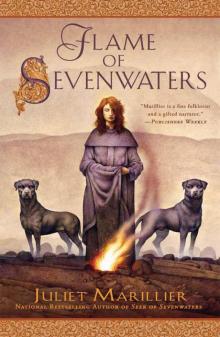 Flame of Sevenwaters
Flame of Sevenwaters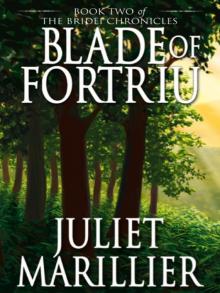 Blade of Fortriu
Blade of Fortriu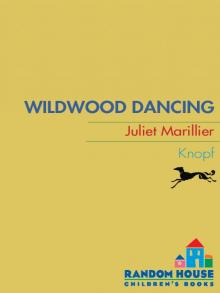 Wildwood Dancing
Wildwood Dancing Dreamer's Pool
Dreamer's Pool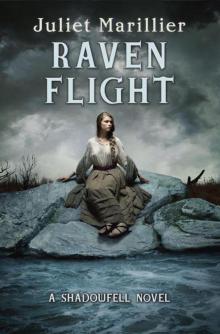 Raven Flight
Raven Flight Heir to Sevenwaters
Heir to Sevenwaters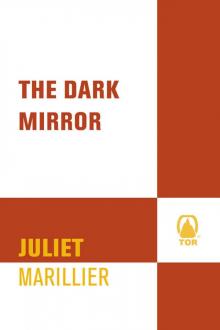 The Dark Mirror
The Dark Mirror Daughter of the Forest
Daughter of the Forest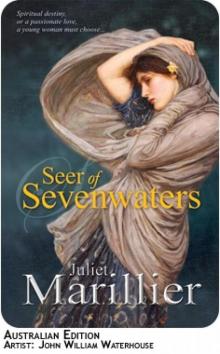 Seer of Sevenwaters
Seer of Sevenwaters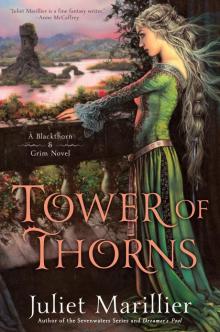 Tower of Thorns
Tower of Thorns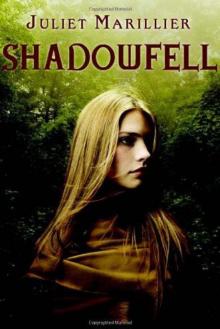 Shadowfell
Shadowfell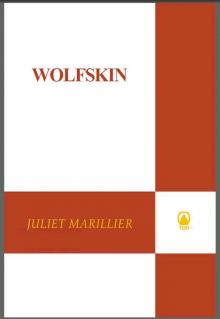 Wolfskin
Wolfskin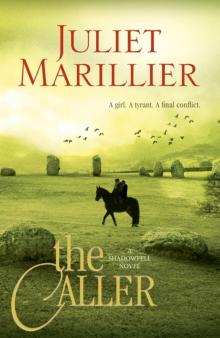 The Caller
The Caller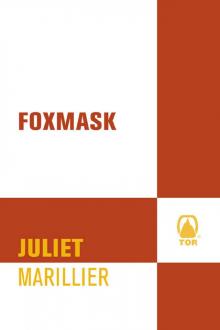 Foxmask
Foxmask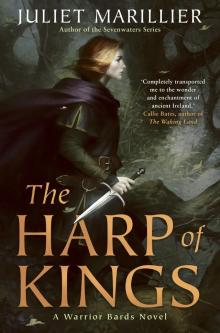 Harp of Kings
Harp of Kings The Well of Shades
The Well of Shades Heart's Blood
Heart's Blood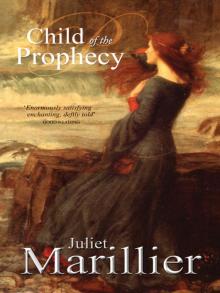 Child of the Prophecy
Child of the Prophecy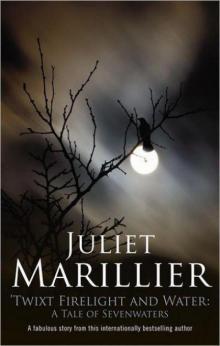 Twixt Firelight and Water
Twixt Firelight and Water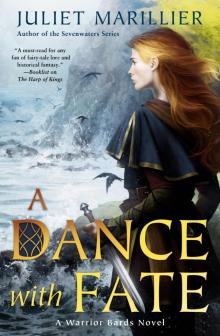 A Dance with Fate
A Dance with Fate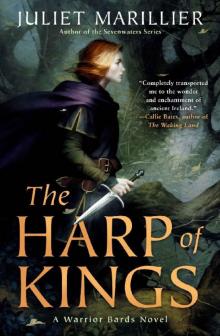 The Harp of Kings (Warrior Bards)
The Harp of Kings (Warrior Bards)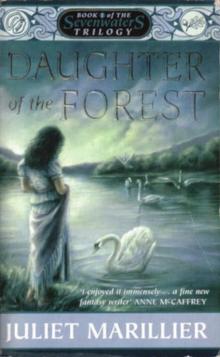 Daughter of the Forest (The Sevenwaters Trilogy)
Daughter of the Forest (The Sevenwaters Trilogy)![Sevenwaters [06] Flame of Sevenwaters Read online](http://i1.bookreadfree.com/i2/04/08/sevenwaters_06_flame_of_sevenwaters_preview.jpg) Sevenwaters [06] Flame of Sevenwaters
Sevenwaters [06] Flame of Sevenwaters![[Sevenwaters 04] Heir to Sevenwaters Read online](http://i1.bookreadfree.com/i2/04/12/sevenwaters_04_heir_to_sevenwaters_preview.jpg) [Sevenwaters 04] Heir to Sevenwaters
[Sevenwaters 04] Heir to Sevenwaters